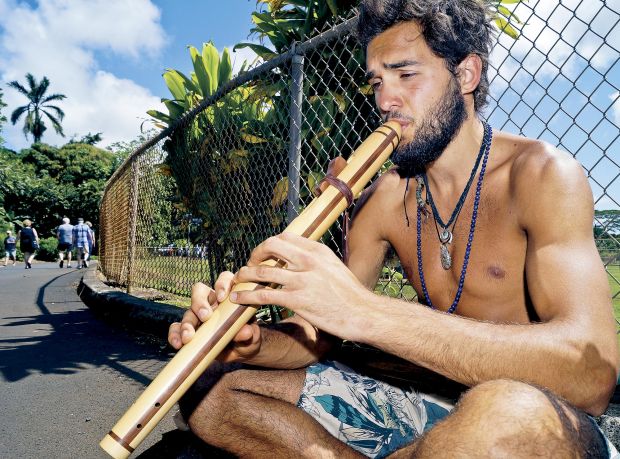KOLOA — A wind blowing in the 20 to 25 mph range mixed in the flurry of heavy-bodied notes as it rustled through the air at the Koloa sunshine market. “This is our day to connect with the ‘aina,” said
KOLOA — A wind blowing in the 20 to 25 mph range mixed in the flurry of heavy-bodied notes as it rustled through the air at the Koloa sunshine market.
“This is our day to connect with the ‘aina,” said the companion of Kenneth Schawmberg, a farmer from Washington. “We’re traveling around to get to know the island better. Normally, Schawmberg is with Phil Villatora at Children of the Land, surrounded by keiki who are anxious to learn how to play the flute.”
Schawmberg, eyes closed in meditation and focus, produced more of the notes, which were quickly grabbed up by the wind and dispersed among the throng of shoppers. “Flutes are very spiritual,” Schawmberg said. “They find you. This is a Native American wood flute made of yellow cedar, rosewood and monkeywood, or purple heart wood. I got this in Portland, Ore., at the Oregon County Fair.”
A member of the Powhatan tribe, Schawmberg says he has connection with Polynesia, now a member of the Kingdom of Atooi.
From within the depths of his backpack, Schawmberg pulled out a Hawaiian nose flute and a flute which was made and autographed by Wes Ricks.
Born in Louisiana, Ricks’ music is a by-product of his Choctaw Indian roots, states his website.
His musical journey started in Vietnam where he was a “River Rat” for the U.S. Navy, patrolling the waters in search of Viet Cong and contraband smugglers.
Following his tour of duty, he signed up for guitar and keyboard lessons through the Phoenix Veterans Affairs Health System’s Recreation Therapy program.
But the distinctive sound of a pentatonic flute played by Native American flutist, Sagio, called to him while he and his wife were walking through a mall in Tempe, Ariz. Ricks was hooked.
Music was put on hold for 12 years while he cared for his wife until her death in 2007. Now, volunteering with the VA, Ricks expresses his “inner self” through his music — his heritage, heartache, harrowing experiences and happiness.
“This guy came up to me and had the (Wes Ricks) flute,” Schawmberg said. “I spent my last money on it. This one is made from Alaskan cedar and sitka spruce.”
Air creates the distinctive notes from flutes, evidenced by the difference in tones and sounds as the Washington farmer switched from his Native American wood flute to the Wes Ricks instrument and then to the bamboo Hawaiian nose flute.
“In Polynesia, the reason they have nose flutes is because they believe the mouth is where all of the impurities are,” Schawmberg said. “This said, they use their nose to play the flute because of the pureness of the air.”


